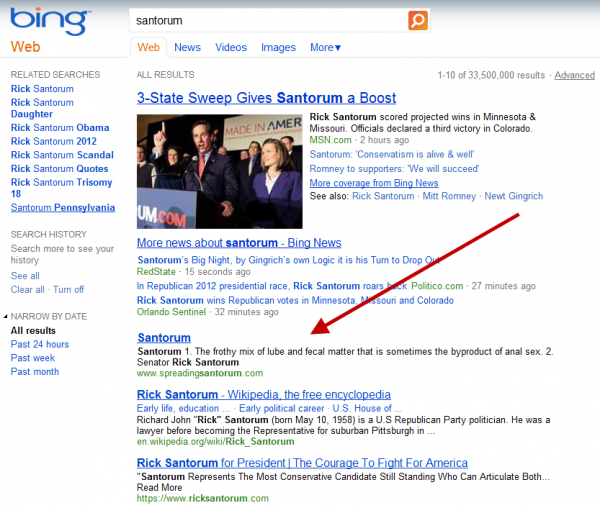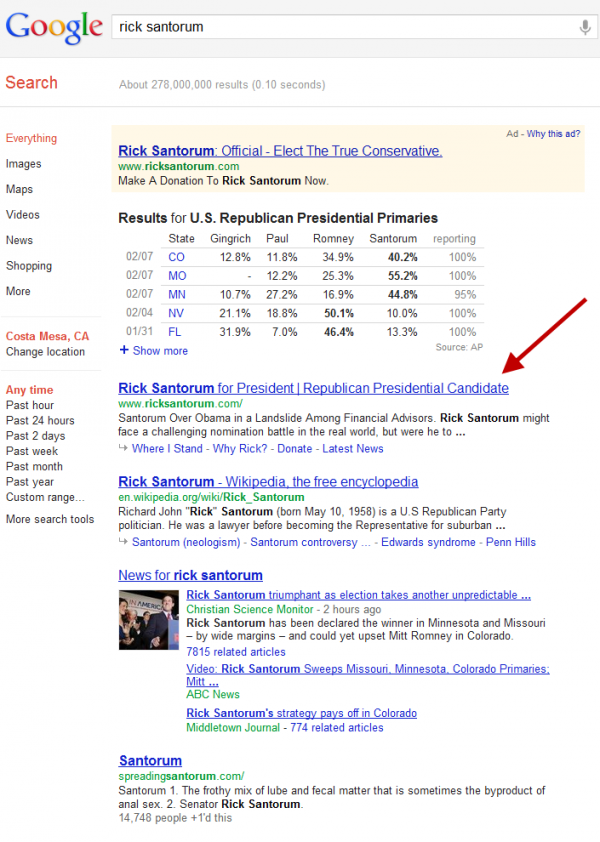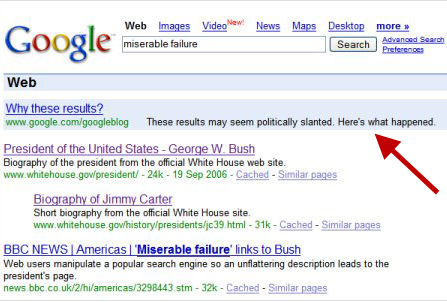Why Does Microsoft’s Bing Search Engine Hate Rick Santorum?
US presidential candidate Rick Santorum pulled off a surprise last night, winning caucuses and primaries in three states. So what’s with Bing listing an anti-Santorum web site first in its results in a search for his last name? Does Microsoft have some type of liberal agenda! Wait, you didn’t realize Rick Santorum has a “Bing […]

Wait, you didn’t realize Rick Santorum has a “Bing problem” that’s exactly the same as his well-documented “Google problem,” where a search for “santorum” lists a web page defining that word as the by-product of anal sex above Santorum’s official web site?
He does. In fact, Santorum’s had his Bing problem for months, if not years. It’s just that everyone fixates on Google. Even Santorum does when he gets asked about it, such as telling Politico last year:
“I suspect if something was up there like that about Joe Biden, they’d get rid of it,” Santorum said. “If you’re a responsible business, you don’t let things like that happen in your business that have an impact on the country.”
He continued: “To have a business allow that type of filth to be purveyed through their website or through their system is something that they say they can’t handle but I suspect that’s not true.”
It’s A Search Engine Problem, Not A Google Problem
In the wake of Santorum’s win, and no doubt eventual questions in some quarters about why Google still isn’t “fixing” things for him, I thought it was worthwhile to flip things around and discuss his Bing issue.
It’s worth stressing that this isn’t just some gay-loving-Google-liberal-leaning-hates-Santorum thing and more a general problem Santorum has with the major search engines. In particular, it’s a problem that’s ultimately down to Santorum’s anti-gay views.
Santorum & Bing: Just Like Google
Here’s what Bing currently shows for santorum:
You can see that just after the special news area that Bing inserts above the regular results, the first listing that the arrow points to is for SpreadingSantorum.com, with a description that reads:
Santorum 1. The frothy mix of lube and fecal matter that is sometimes the byproduct of anal sex. 2. Senator Rick Santorum
Santorum’s own official site, RickSantorum.com, appears third on the list.
Over at Google, which gets all the attention, the same issue happens:
Google’s news box appears further down on the page, probably because of the special election results box that appears at the top. Spreading Santorum, the anti-Santorum web site, appears as the first regular result. The official Rick Santorum web site appears fourth in the regular listings, one further down than with Bing.
By the way, the same thing also happens at Yahoo. Since Yahoo largely depends on Bing’s results, a search on “santorum” brings up the anti-Santorum site first, as it does with Bing — though after Yahoo’s own news units.
The news is better for searches for Rick Santorum’s full name, rather than just the word “santorum.” In that case, his official site ranks tops. Here’s Bing:
And here’s Google:
Does It Matter?
It’s becoming clear that Santorum’s Bing problem, as with his Google problem, isn’t stopping many Republican voters from selecting him over other candidates. So should Google or Bing really worry about trying to somehow fix it, especially when any type of change like that opens them up to accusations about censorship or political favoritism?
Perhaps.
The SafeSearch Solution
The biggest issue to me might be the fact that as interest in Santorum grows, you’ve got more children in schools likely to be searching on his name. Getting a fairly explicit description in their search results talking about “lube and fecal matter” and “anal sex” might not be what a lot of parents want them seeing.
Both Bing and Google have a SafeSearch filter that is set to “Moderate” by default, which means it only filters out explicit images. Setting this to “Strict” will keep the Spreading Santorum site from appearing in text listings. That’s something parents and teachers can use.
It’s Not An Irrelevant “Google Bomb”
How about a manual intervention to solve this problem, which has mistakenly been called a “Google Bomb.” Didn’t Google do something like that for President George W. Bush?
“Liberal leaning” Google did. The Google Bomb fix wasn’t specifically designed just for Bush, who found people were linking to his biography in a way to make it rank tops for “miserable failure.” It was meant to fix any type of case where people tried to make pages rank for odd phrases that they weren’t relevant for. But questions about the prominent Bush listing helped prompt the fix.
The Spreading Santorum site isn’t ranking because of some type of Google Bomb campaign. It ranks because it is entirely relevant for “santorum.” It was created years ago as a protest against Rick Santorum’s anti-homosexual views. Those views are entirely relevant, in fact arguably more relevant the further Santorum advances as a candidate to be president of the United States.
To drop the site, Bing and Google would actually be making the type of political move that Santorum seems to think that Google is already doing (he clearly doesn’t seem to think about or care about Bing).
But How About A Disclaimer?
There is something that Google is long overdue to implement. Consider what it used to show when you’d search for “miserable failure” and got the George W. Bush biography:
See the ad above the listings that the arrow points to, which say:
Why these results? These results may seem politically slanted. Here’s what happened
The ad led to an explanation at the official Google Blog. Google does a similar thing today, for a search on jew, which brings up an anti-Jewish web site:
It’s long past time for Google to do something similar for searches on “santorum.” They are going to confuse some people, who will assume Google’s trying to advance a political agenda with its search results.
I’d say Bing should do the same thing, but Bing’s never even tried to have explanations like this. Maybe it should consider it.
But Spreading Santorum Is Here To Stay
As for Rick Santorum, as I wrote before, the best way to solve his Google and Bing problems would be to change his views on homosexuality or make a donation to a gay marriage-rights group. That’s what Dan Savage, who created the Spreading Santorum site, told Mother Jones in 2010:
Savage has not forgiven Santorum for his seven-year-old comments: “Rick would have prevented me and my partner from being able to adopt my son,” he points out. But Savage does have a deal for the politician. “If Rick Santorum wants to make a $5 million donation to [the gay marriage group] Freedom to Marry, I will take it down. Interest starts accruing now.”
That’s unlikely to happen, so Santorum will have to continue living with the Spreading Santorum site showing up alongside his own.
Related Entries
- Should Rick Santorum’s “Google Problem” Be Fixed?
- How Rick Santorum Is Making His “Google Problem” Worse
- Dear Google: Crappy Results Like This Don’t Give The Impression You Care About Search
- Google Kills Bush’s Miserable Failure Search & Other Google Bombs
- Google Says Stephen Colbert Is No Longer The Greatest Living American
- After Santorum’s Win, The Daily Show & Colbert Report Laugh Again At His Google Problem
Postscript: There have been many updates to this story. See our Santorum’s Google Problem category for the latest articles.
Contributing authors are invited to create content for Search Engine Land and are chosen for their expertise and contribution to the search community. Our contributors work under the oversight of the editorial staff and contributions are checked for quality and relevance to our readers. The opinions they express are their own.
Related stories
New on Search Engine Land





